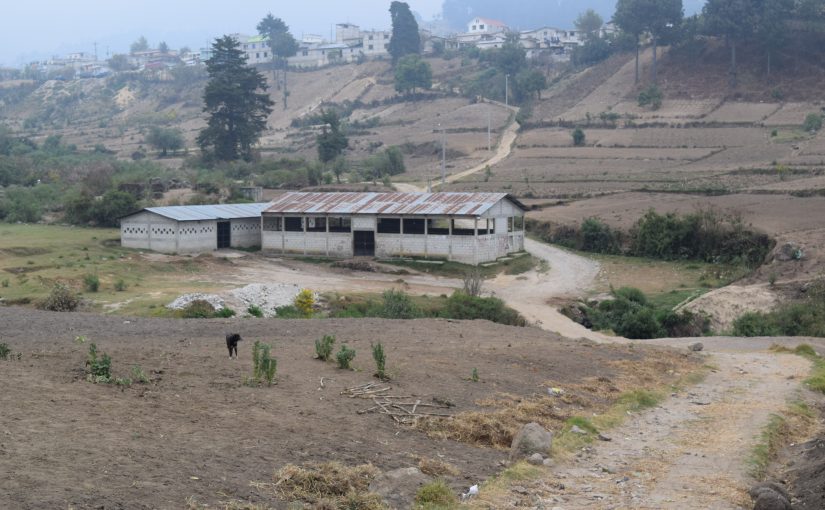In K’iche’ there are two passive constructions which highlight the object of the verb without expressing the agent or subject. We simply refer to them as Passive I and Passive II. In this unit we will deal with Passive I, and we will move on to Passive II on the following one.
In the following video, Nela asks Nan Xe’p to help her because her son is sick.
In passive voice the underlying object of a transitive verb is made into the subject of the passive verb phrase. Passive verbs are intransitive, which means that only one argument, the subject, is marked on the verb –with Set B pronouns. In the passive the agent of the underlying transitive phrase is not marked inside the verb anymore; it is demoted to an oblique and has to be introduced (when wanted) by the relational noun -umal. In English, the agents of passive constructions are introduced by by. For example:
Active:
- Xukunaj le yawab’ le aj q’ij
he healed the sick-one the daykeeper
The daykeeper healed the sick-one
V O A
Passive:
- Xkunax le yawab’ (rumal le aj q’ij)
was healed the sick one (by the daykeeper)
The sick one was healed (by the daykeeper)
V S (oblique)
Since the passive verb can only bind one argument to itself in a passive construction, we have to use Set B pronouns to mark the S of passive verbs in K’iche’. The passive verbs work like an intransitive verb, and as such, it adds the marker –ik when used at the end of a phrase.
PASSIVE I
The passive is marked on the verb as follows:
non-CVC transitive verbs: -x + (ik) (the –x replaces the –j from active voice)
- Xukunaj (active) ‘she healed him’ –
Xkunaxik (passive) ‘she was healed’
CVC transitive verbs: lengthening of the root vowel + (ik)
- Xuchapo (active) ‘he grabbed it’
Xchapik (passive) ‘he was grabbed’
If you want to express the agent for the passive voice verb, the relational noun –umal is used.
- Xkunax le yawab’ rumal le ajq’ij
The sick one was cured by the day keeper
However, you can do this in Passive I only if the agent is in the third person (by him/her/it; by them). You have to use active voice if you want to express agents for the other persons:
The man was cured by me.
*xkunax le achi wumal (this is not permitted)
Earlier we have seen that you cannot have a third person agent together with a second person formal object in active transitive verb constructions. The same concept however can be expressed by a passive construction:
*Xukunaj la (he healed you (formal))
For these constructions a passive is used:
- Xkunax la rumal.
You were healed by him. - Kakunax la rumal.
You are healed by him.
More examples of Passive I constructions:
- Xukunaj le ala ri ixoq. The woman cured the boy.Xkunax le ala (rumal ri ixoq). The boy was cured (by the woman).Le ala xkunaxik. The boy was cured.
- Xkichap le tz’i’ ri alab’om. The boys grabbed the dog.Xchap le tz’i’ (kumal ri alab’om). The dog was grabbed (by the boys).Le tz’i’ xchapik. The dog was grabbed.
- Xeril le taq wakax ri ali. The girl saw the cows.Xe’il le taq wakax (rumal ri ali). The cows were seen (by the girl).Le wakax xe’ilik. The cows were seen.
- Xatkito’ ri achijab’. The men helped you.Xatto’ (kumal ri achijab’) You were helped (by the men).Xatto’ik. You were helped.NOTE: Some dialects do not have long/short vowel distinctions. Also be aware that you may not hear the distinction in vowel length, and therefore you must pay close attention to the person-marking on root transitives:Which one means “He found the dog” and which one means “The dog was found”?Xriq le tz’i’.Xuriq le tz’i’.
| anab’ | sister |
| b’a | (affirmative particle) |
| ch’aj (vtr) | to wash |
| chap (vtr) | to grab |
| che’ | tree, jail |
| eta’maj (vtr) | to learn |
| kam’ix | shirt |
| kunaj (vtr) | to cure |
| laq’apuj (vtr) | to embrace |
| majij (+verbal noun) | to begin |
| majij (vtr) | to begin |
| no’j | though, way of thinking |
| q’aluj (vtr) | to carry in arms |
| riq (vtr) | to find |
| sipaj (vtr) | to give |
| solij (vtr) | to visit |
| su’ (vtr) | to wipe, to clean |
| tz’apij (vtr) | to lock |
| tzalij (vit) | to return |
| tzalij (vtr) | to return something |
| tzaqapij = tzoqopij (Nahualá) | to let go of somehting |
| we ne | maybe |
| we | if, when |
| xa ne | if not… |
Change the following verbs/phrases to passive I constructions. Translate them into English:
- Xatinto’o
- Xujril le utiw.
- Xqab’an qachak.
- Xinloq’ le po’t.
- Xkisipaj jun kami’x chwe.
- Xinriq le ame’s.
- Xutij le wa ri ala.
- Xinaq’aluj.
- Xasu’ le awo’ch.
- Xintz’ib’aj le wuj.
- Xatkisolij le achijab’.
- Xub’an jun po’t we wanab’.
- Xujto’ alaq.
- Xatkiriq le ixoqib’.
- Kakikamisaj le utiw ri achijab’.
- Xuk’ayij jun ak’ ri ixoq.

